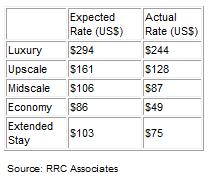The Hotel Data Conference was held this past week at Loews Vanderbilt Hotel in Nashville. One of the headlines from the conference caught my attention with – Â
“Hoteliers could be leaving as much as US$50 on the table by not charging guests what they expect to pay.â€Â
The statement is based on a presentation by Nate Fristoe and the RRC Associates Travel Intentions Survey which showed U.S. leisure travelers late last year had expected to pay $294 per night for a luxury hotel in January to June 2010. The rate paid for a luxury hotel night during this time period was actually $244 per night.
The conclusion appears to be that hoteliers could have charged an extra $50 per night for their hotel rooms and consumers would have accepted those rates.
Really now?Â
The last two luxury hotels I stayed in received an extra $5 of that $50 on the table when I needed to purchase coffee in the morning. Luxury hotels are the only hotels I have stayed in the past year where there was no complimentary coffee service in the hotel lobby. And often the complimentary coffee in luxury hotels is so discreetly placed that you need to ask where to find this freebie, if available.Â
The RRC Associates data showed leisure travel price gaps for all market segments from economy to luxury hotels with the smallest gap in the midscale hotel market at $106 expected rate vs. $87 actual rate. Surprisingly to me is economy hotel rates were the next biggest consumer-seller gap with leisure travelers anticipating rates of $86 per night for the first half of 2010, but actual spending came to just $49 per night for a $37 room rate gap.Â
Upscale hotels showed a $33 gap from $161 expected to $128 actual rate paid.
So does this mean hoteliers will be raising rates rapidly in the latter half of 2010?Â
Some markets like New York City appear to be pushing the rate ceiling skyward again with room rates jumping more than 10% in the past year. Rate increases on average are still confined to a few hot spots in the U.S.
Consumer sentiment is still low as we finish out the 2010 year. Another finding by RCC Associates Travel Intentions Survey is leisure travelers clearly consider room price the most critical factor (44%) when choosing a hotel. Loyalty programs came in distant second with 16% of respondents citing this as a factor in choosing a hotel.
Luxury Hotels are making a big comeback in occupancy and price rate increases in 2010, but is that attributable to the lower, and might I say more reasonable pricing for luxury hotels this past year?  Â
The consumer optimism of six months ago has taken a hit as the economic recovery stalls for working Americans and travel plan expectations diminish. Destination Analysts, Inc published their report in July, “The State of the American Traveler†(pdf) with the headline “Leisure Travel Outlook Weakensâ€.
My September column for InsideFlyer used data from that report to argue that hotel recovery without a recovery in the economic conditions for the vast majority of leisure travelers makes rapidly rising hotel rates a move that will drive millions of Americans to downsize hotel market class segments to cheaper rate segments – luxury to upper-upscale; upper-upscale to upscale; midscale to economy – or even move away from hotels altogether.
“Glamping” seems to be the 2010 replacement for hotel staycation. Google search glamping!
I wonder how the Economy sector of hotels will survive low rates in the $50 range while the upscale and luxury segments of hotels push hard to bring rates up at a more rapid pace. The divide in hotel rates and economic classes may mirror the widening American income gap between the wage class and wealthy class.
The economy sector of hotels is still losing rate pricing ability in the latter half of 2010 while luxury and upper-upscale hotels are geared to test the rate increase waters in the last half of 2010.
Can luxury hotels continue to fill rooms and maintain occupancy in 2011 with higher rates?
In early 2009 the industry analysts were saying 2010 would be the year when hotels would come out of the rate doldrums. By late 2009 the forecasts were more subdued. Now in August 2010 the industry is predicting a better 2010 end-of-year forecast with 2011 forecast to be even better.
The lackluster hotel loyalty promotions going into the fall 2010 season leave me wondering if hoteliers will see a drop in occupancy when rates go up and hotel loyalty promotions drop out.
I still have my doubts on a U.S. hotel recovery in 2011.




4 Comments
Comments are closed.